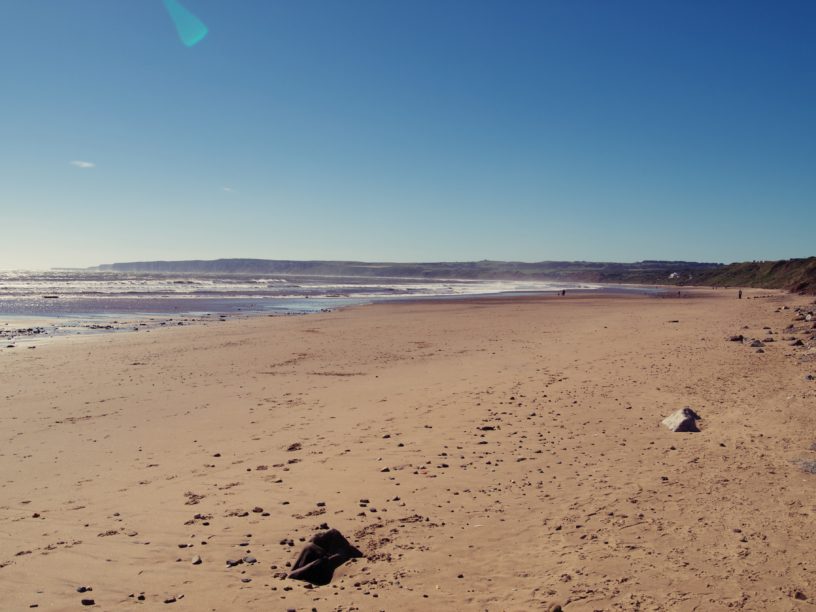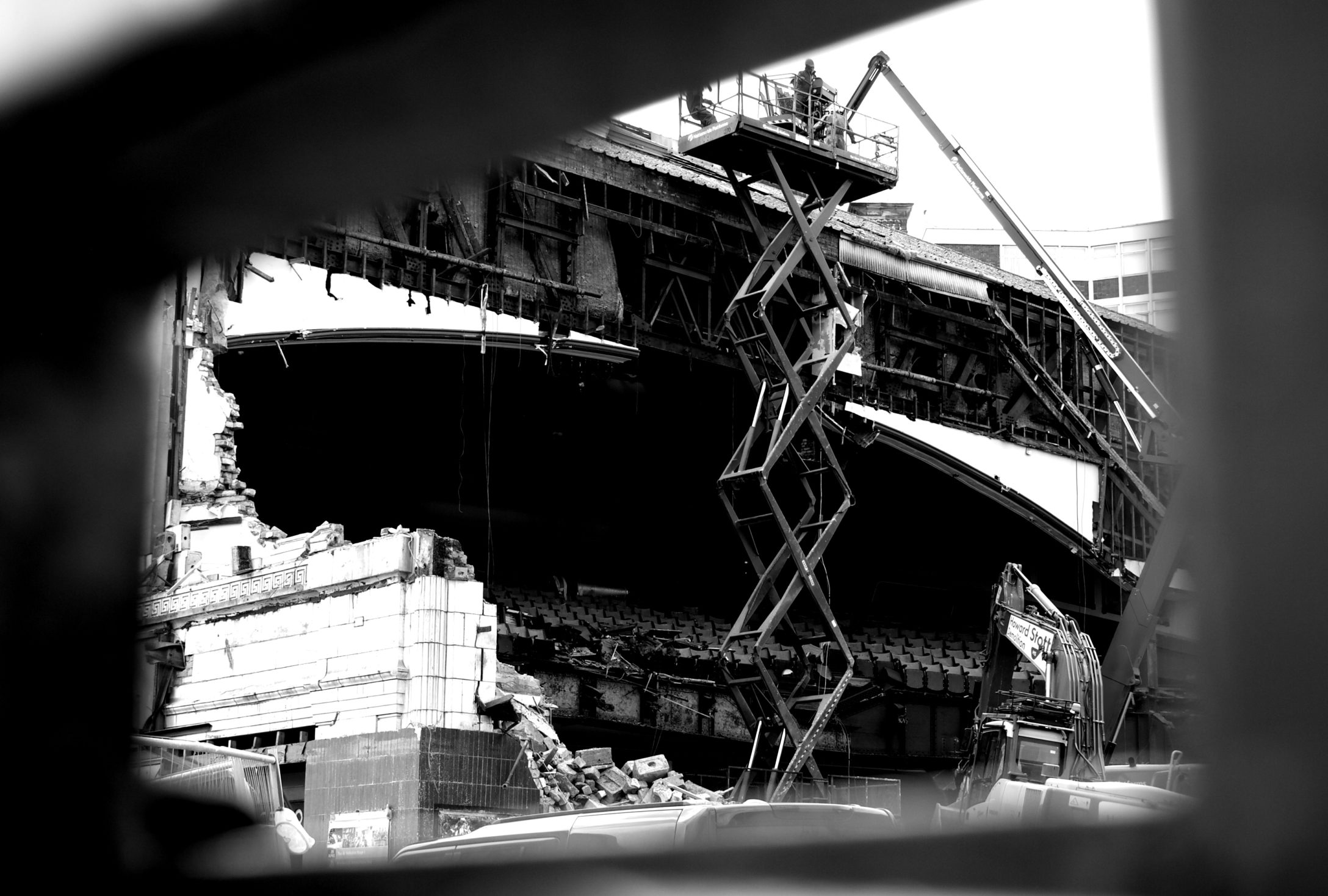December 15, 2018
Scarborough, England
I parked at the top of the multi-storey car park. I swung the car hypnotically around each ramp-corner, making my way up to the top level where the view is the best. It was one of those grey days, where the sky is the same colour as the sea and the fields. Even the moors which hedge the town were murky—a patchwork of browns and dull greens. From the top of the car park you can see how the town grew up, the higgledy piggledy medieval roof tops give it away; the crammed-too-close-together, short and tall buildings with sagging roofs juxtaposed between grand Georgian pillared house fronts and gothic Victorian arches and, the brutalist 1960s architecture which sticks out like a bad tooth.
My car was the only car on that level, though there were a few shoppers to nod a brief hello to as I made my way down the stairs, watching the town slide to eye level through the windows. There was a thrilling cold to the air which made me long for soup and hot tea, but I wanted to get down on the beach, first, and reset my brain after spending what felt like weeks hunched over my home computer, getting on top of my work in preparation for the Christmas break.
There were very few people in town. The disproportionate number of storefronts run by estate agents gleamed hopefully with Christmas lights, but had no patrons. I dropped a couple of pounds into the hat of a homeless man who was asleep in a doorway, his hood pulled right up and over his head, tied so tight I couldn’t see his face. A busker played “Danny Boy” beautifully on an accordion, so I threw a pound into his bucket too and walked down towards Eastborough and the old town. The steep descent pulled on a slight muscle tear that I’d got from doing squats at the gym.
On this stretch, all the rock shops, the gift shops, the joke shops, the bargain basement clothes shops, and the curiosity shops with their dried sea creatures and shells were closed for the season. The charity shops, the betting shops and the bars were open. The bakery on the corner promised four cheese straws for a pound, an offer I couldn’t refuse. I bit into the warm fluff of buttery pastry and cheese while I stood looking up at the derelict splendour of the Eastborough Congregational church, with its dominating motto: “Enter into His Gates with Thanksgiving.” It towers above the boarded up doors, the plywood swollen with winter rain and daubed with graffiti. The building has always fascinated me; it has been on the brink of being developed into flats or a nice house for as long as I can remember. I read somewhere that there had been an archaeological excavation there before they started the conversion and bones were found beneath the flooring and some pottery from the twelfth century. But here it was still, a derelict shell, sandwiched darkly between a tattoo parlour and a closed driftwood art gallery.
As I turned the corner I saw the harbour, its few remaining fishing boats clink-clinking against each other. There were a three red-beaked oyster catchers huddled on the stacked lobster pots, and the white back of a seagull caught the sharp winter light. The air was so cold here it made my cheekbones ache, and the sea, driven against the harbour walls by the wind, sloshed onto the cobbles with a sound like broken glass being swept up. No one was down on the foreshore, though the arcades still blinked their mesmeric lights in anticipation. No restaurants were open, save for one chip shop takeaway where a bored teenager was studying their iPhone. The shop frontage was lit amongst the darkened closed doors, like a modern day, Northern English version of an Edward Hopper scene.
Next door they were demolishing the Futurist theatre. They’d knocked the whole of the front off and exposed the auditorium. The graduated circle of seats, the Victorian plasterwork, the plush reds and golds leaned forward as if an invisible audience was sat looking out to sea, waiting for a show to start. The Futurist had been one of the oldest theatres in Britain, and at one time the biggest, hosting The Beatles, Shirley Bassey and all the old comedy greats. Now the council wanted the land for a theme park, something else to be closed in the winter. It made me sad to see it hanging open like this. I saw my first ballet at the Futurist, and remembered it as a doorway into a world that was not about the frenetic activity of a town preparing for the summer season. It something for the residents, something exotic and beautiful, something which catered to us all.

I stood at the rails looking out towards the cliffs. Despite the greyness of the town in winter I prefer it to the summer season, when you can’t move for tourists, when the sun seekers and families coat the beaches like sea lions in a sunscreen-slick carpet of flesh. A few seagulls wheeled overhead, scrutinising me to see if I had food. There were a couple of dog walkers bracing the cold, making their way along the thin strip of sand that the incoming tide had left.
The cliff lifts were closed and wouldn’t reopen until the spring, so I stomped slowly up the steep steps, past the Rotunda museum and past the Grand Hotel, once the biggest in Europe. Its flags were still flying from the top turrets. I’d hoped to pop into the antique shop on that street, but that too was closed on this bright, cold, winter morning. Instead, I settled for a latte in one of the new trendy coffee bars which had cultivated the appearance of somewhere old by the placement of shabby chic chairs and tables and low hanging bare bulbs. The irony of the situation was not lost on me: while these new bars and coffee shops wanted to emulate the retro seaside look, the council was busy destroying the actual buildings that had seen the town through centuries of development.
I left town feeling despondent. It’s difficult to watch your childhood being pulled to pieces. Before I went home I made my way to the bookshop. At least the heating was on in here and I was able to unwind my scarf for a few minutes and thaw out in the fake homeliness of the tall bookshelves. Outside the wind whipped a newspaper into the air where it circled briefly before disappearing over the roof tops.






